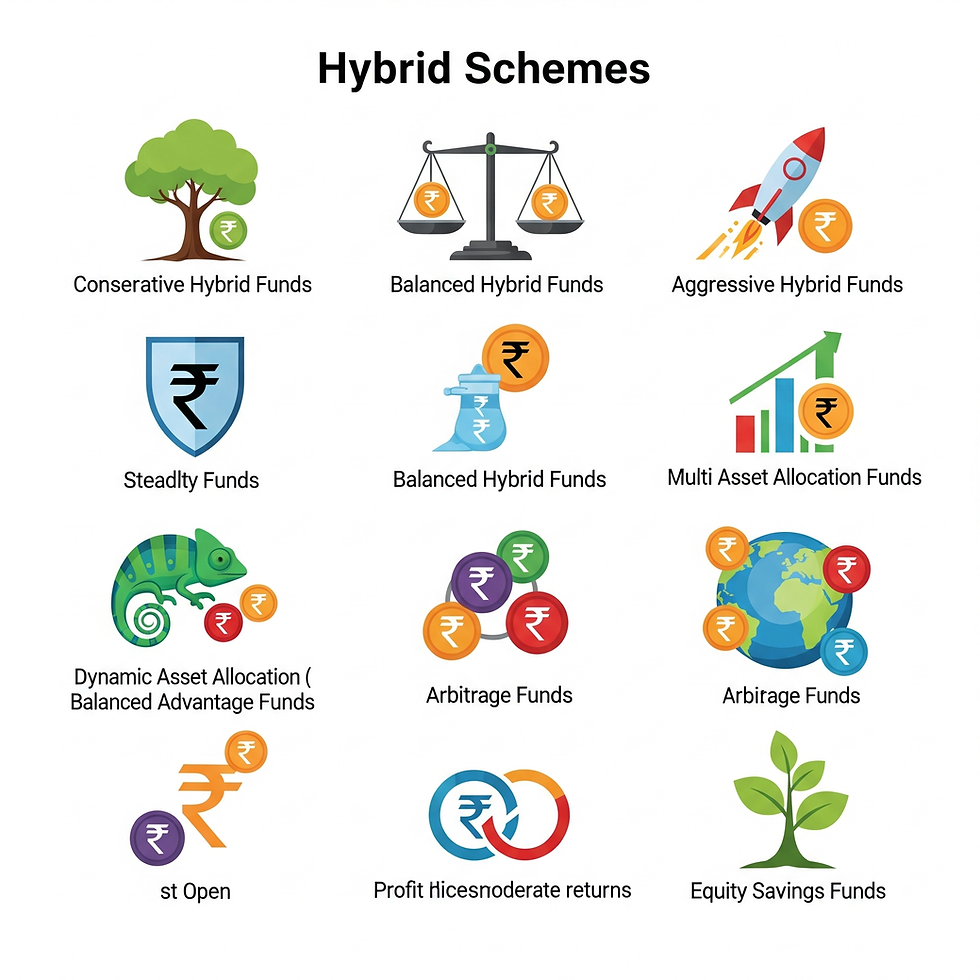What are the Effects of Inflation?
- M Manohar Rao
- Jan 18, 2025
- 6 min read

Tags: Wealth Management, Investment Lesson, Mutual Funds, Stock market, Budget, Finance, Investing, Personal Finance, Investment
Article Summary
Inflation’s most visible and pronounced impact is the reduced purchasing power of money.
Inflation over long periods requires increase in corpus for major financial goals like retirement.
Inflation for certain items such as higher education and healthcare is typically even higher than general inflation.
The most effective way of combatting the harmful effects of inflation is to regularly invest money and ensure it grows faster than inflation.
Equity and equity-oriented investments, which witness short turbulence, have the potential to deliver inflation-beating returns in the long term i.e., 8-10 years or more.
In equity mutual funds, investors have a convenient investment vehicle to combat inflation and fulfil major needs.
While cleaning up your cupboard, you stumble upon your old wallet you last used ten years ago. Amazingly, you find a Rs. 100 note. Now, what might appear as a windfall is actually a significant loss of purchasing power of the note. Because what you could’ve bought with the 100 note 10 years ago, would probably cost way more now.
Effect of inflation Thanks to the average annual inflation rate of 5.47% during 2012-22, the Rs 100 note can only buy Rs 56.92 worth of what it did ten years ago. That is a 43% decline in purchasing power. Such is the impact of inflation.
Effect of inflation is felt around the world. It is a constant phenomenon where people experience the ill-effects of decline in value of money during inflation. At the same time, people tend to feel the pain from inflation more during periods of sharp increase since it impacts immediate and imminent expenditures. But what about major future needs?
What happens during inflation? In our example, if a person had retired in 2012, the person would have had to dig deeper into retirement savings to maintain the living standards in 2022. Thus, in 2022, the retired person would have needed to spend Rs 170.41 to replace the Rs 100 needed in 2012.
For many major future needs, the impact on the value of money with inflation is difficult to estimate and that is why it is prudent to ensure ample savings to cushion oneself from the impact of inflation. But this is easier said than done, especially for three major future needs.
Inflation Challenge for Major Financial Goals
Retirement From our example, we have already seen the impact of declining value of money during inflation in a decade. Thus, things can get tough if the retired life turns out to be more expensive than planned. In such cases there are risks of downgrading your lifestyle, or worse, running out of money. The bad news is that those threats are now real.
According to World Bank, in 2021, life expectancy in India for men was 66 years and 69 years for women*. According to a 2020 study entitled “Population Projections of India and States” by National Commission on Population, by 2036, life expectancy in India will rise to 71.7 years for men and 74.66 for women**. In many Indian states, the average life expectancy is already in the late 70s***.
Children’s Higher Education As with retirement, planning for children’s higher education requires you to combat the significant impact of inflation. Across the world, higher education costs tend to rise faster than general inflation. Let’s take an example from India.
During 2008-13, annual tuition fees at a prestigious technology institute increased by 80% to Rs 90,000#, or 12.47% annual rise. By 2019##, it more than doubled further to Rs 2 lakh, or a 14.2% annual rise. This rise needs to be viewed in the backdrop of general annual inflation of 7.31%^ during the 12 years of 2008-19
It is worth pointing out that charges are far higher for private institutes across disciplines. Also, there are other costs such as those for hostel, transportation, books, and devices. Costs for foreign education are still higher, typically costing Rs 10 lakh annually and more, depending on the discipline and the country.
Health expenses Like expenses for higher education, healthcare expenses also tend to grow faster than inflation. According to a 2020 report by Milliman, a global consulting firm involved in insurance and employee benefits, in 2019, medical inflation or inflation in healthcare services, was over 9%### in India. This is far higher than the general inflation rate of 4.76%^ that year.
Despite health insurance covers available in India, its coverage is low and not all medical expenses are covered. Only 18%^^ of people in urban areas and 14%^^ in rural areas are covered by health insurance, one of the lowest in the world. Further, 62%^^^ of all medical expenses are paid by individuals from their pockets or what is known as Out of Pocket Expenses.
Combating Inflation With Investments
Now that you have seen what happens during inflation, it would be clear to you that to preserve your purchasing power and standard of living besides meeting major future goals, your money needs to grow faster than inflation.
Why merely saving is not enough Popular savings instruments such as savings bank account, fixed deposits (FD) and recurring deposits (RD) offered by banks, financial institutions and post office are not helpful in fighting inflation. For instance, in 2022-23, bank savings accounts typically offered annual interest rate of 2.7-4.0% p.a$, one year bank FD typically offering 6.8%$$with one year RD offering 3.5-7.0% p.a$. When compared to annual inflation rate of 6.67% for 2022-23, money parked in them almost in all cases lost purchasing power.
Combating inflation with equities An ideal option to combat inflation is to make long term investments in equities. They typically help grow money much faster than inflation over the long term i.e., 8-10 years, or more. The good news is that in equity and equity oriented mutual funds, investors have an easy and convenient option to combat inflation. They can do so by accessing investment expertise of expert fund managers and invest small amounts regularly with Systematic Investment Plans (SIP) for major financial goals such as children’s higher education.
To sum up, the effect of inflation is all pervasive in the world of any person’s finances. To equip oneself to combat inflation and the declining value of money with inflation, one should ensure that the growth money always stays well ahead of it with rewarding investments.
Source:
^^ India's Health Insurance Market 2023-2030: Expanding Opportunities and Government Initiatives Drive Growth (yahoo.com)
$ Various bank websites
$$ SBI one year fixed deposit for 2022-23; https://sbi.co.in/web/interest-rates/interest-rates/deposit-rates#show
FAQs
How does inflation affect different categories of investments?
Analysed from the point of view of asset classes, short term debt investments may not be able to counter the effects of inflation. Erosion of purchasing power from inflation is a certainty with cash. Investment in some commodities such as gold match up to inflation.
In the long term, real estate and equities typically beat inflation. It is worth pointing out that real estate may face issues such as liquidity, while equities are likely to witness turbulence in the short term.
Does the time to a financial goal determine the need for inflation-beating investments?
Farther in time the anticipated need for money, greater will be the impact of inflation on the required amount and the need for inflation-beating returns.
Disclaimer:
The information set out above is included for general information purposes only and is not exhaustive and does not constitute legal or tax advice. All complaints regarding Mutual Fund can be directed towards visit www.scores.gov.in (SEBI SCORES portal). Readers are requested to make informed investment decisions and consult Chaitanya Financial Consultants – 9000628943 / mfd.mmr@gmail.com to determine the financial implications with respect to investing in Mutual Funds.
Mutual Fund investments are subject to market risks, read all scheme related documents carefully.



Comments